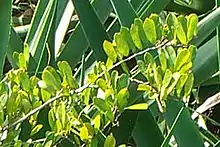Cynophalla flexuosa
Cynophalla flexuosa is a 2–4 meter high shrub.[3]
| Cynophalla flexuosa | |
|---|---|
.jpg.webp) | |
| Cynophalla flexuosa flower, Florida Keys | |
| Scientific classification | |
| Kingdom: | Plantae |
| Clade: | Tracheophytes |
| Clade: | Angiosperms |
| Clade: | Eudicots |
| Clade: | Rosids |
| Order: | Brassicales |
| Family: | Capparaceae |
| Genus: | Cynophalla |
| Species: | C. flexuosa |
| Binomial name | |
| Cynophalla flexuosa (L.) J.Presl | |
| Synonyms[2] | |
| |
Cynophalla flexuosa flowers from early summer to mid summer.[4] The flowers are white to pink, the thin petals are 1.5 cm long. The fruits are green and cylindrical, up to 15 cm long and contain numerous white seeds which are displayed when the ripe fruits splits open. The pulp is bright pink.[5]
Cynophalla flexuosa grows in coastal regions from Florida, the West Indies, Mexico, Central America to South America.[4][3]

Leaves
References
- Botanic Gardens Conservation International (BGCI); IUCN SSC Global Tree Specialist Group (2018). "Cynophalla flexuosa". IUCN Red List of Threatened Species. 2018: e.T135821648A135821650. doi:10.2305/IUCN.UK.2018-2.RLTS.T135821648A135821650.en. Retrieved 7 December 2022.
- "The Plant List: A Working List of All Plant Species". Retrieved 13 May 2015.
- Gordon C. Tucker (2010), "Cynophalla flexuosa (Linnaeus) J. Presl", Flora of North America online, vol. 7
- "regionalconservation.org". The Institute for Regional Conservation. Delray Beach, Florida USA. Retrieved 2013-03-06.
- "Image of the fruit". Ann Stafford. 2006-12-29.
External links
This article is issued from Wikipedia. The text is licensed under Creative Commons - Attribution - Sharealike. Additional terms may apply for the media files.
